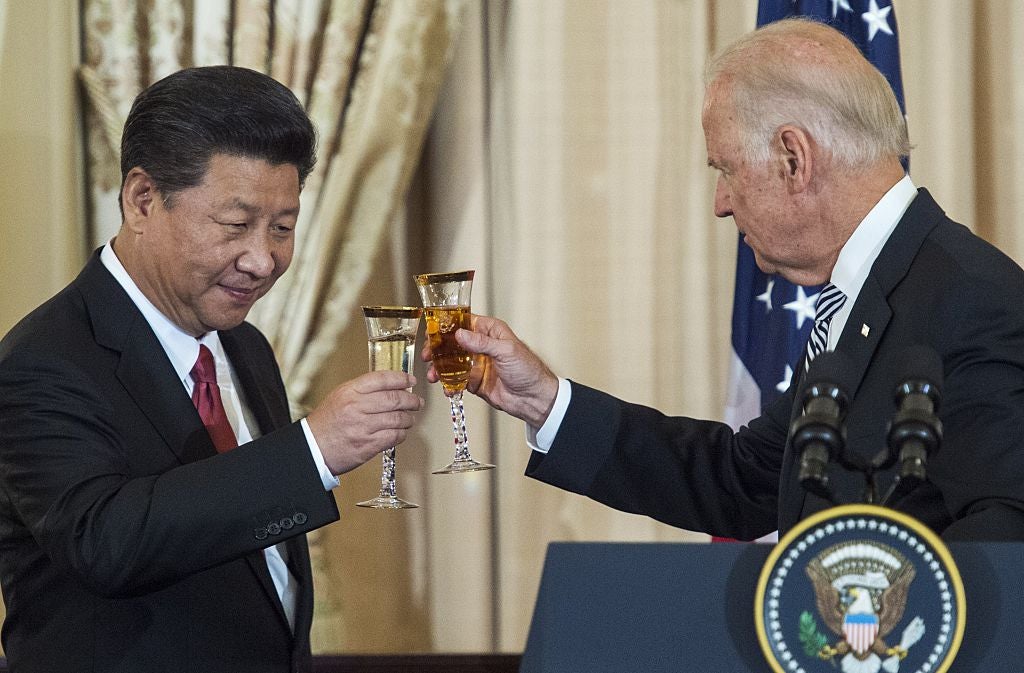Deafening silence from China, Russia and Turkey leaves Biden with plenty to ponder
Amid the flurry of message from well-wishers, there was no acknowledgement of the result from a slew of world leaders. What should President-elect Biden read into this, asks Bel Trew


After five excruciating days, there was a global exhalation of breath when the major US networks declared on Saturday evening that Joe Biden had indeed won the election. Even so, caution remained because Donald Trump had trashed the ballot count so roundly, despite Biden being crowned as victor, that it felt as if it might not matter.
One action that broke this spell was a statement from the Canadian prime minister, Justin Trudeau, the first world leader to publicly congratulate President-elect Biden. This began a tidal wave of global reaction, and official congratulatory statements came pouring in, making Trump’s tweet that he “WON THE ELECTION” seem all the more tiny.
Amid the flurry of messages from well-wishers, however, a deafening silence from some quarters spoke louder than words. It took until this morning for the Israeli prime minister, Benjamin Netanyahu, arguably Trump’s closest foreign ally, to release a statement; there has been speculation that he was devastated by a victory for Biden, who has made it clear he will “reverse” Trump’s policies on issues like supporting settlements and annexation.
Netanyahu, who has been criticised in his country for making the US-Israel relationship partisan, congratulated Biden as a “great friend of Israel”, without expressly calling him president-elect. He followed it up with a tweet that thanked Trump and carefully laid out all the pro-Israel actions the Trump administration had taken, as if to lock in the gains.
But there was complete silence from a slew of world leaders who have yet to acknowledge the results at all, including Saudi Arabia’s king and crown prince; Turkey’s president, Recep Tayyip Erdogan; China’s Xi Jinping; Russia’s president, Vladimir Putin; Brazil’s Jair Bolsonaro; and Iran’s supreme leader, Ali Khamenei.
Dominating this list are Trump’s ideological bedfellows, who will no doubt see his speedy demise as a blow to their populist right-wing agendas, which his unusual presidential style had so bolstered.
Certainly, as Biden’s lead began to grow, Bolsonaro appeared to distance himself from the incumbent president, declaring in a speech shared on his Twitter account on Friday that Trump “is not the most important person in the world”.
The prime minister of Hungary, Viktor Orban, who had publicly backed Trump and admitted he had made no plans for an alternative outcome, only announced his brief congratulations on Sunday afternoon. Instead, pro-government news websites controlled by his allies ran headlines such as “Total chaos in America”, latching on to Trump’s insistence on Twitter that he has still won “the legal votes”.
The “chaos” line was picked up by Trump’s staunchest enemies, who were also noticeably silent. Iran’s foreign minister, Javad Zarif, finally acknowledged the US election results on Sunday afternoon without mentioning Biden or offering congratulations. But Khamenei indicated the outcome was still up in the air, and instead relished what he has twice called the “spectacle” of the vote.
This may be behind the total silence from the Kremlin, which has also benefited from a chaotic US democratic process that is easy to mock. A clear winner and an orderly transfer of power away from a populist leader is not a message that Russia would want to endorse.
That may also explain Beijing’s reluctance to issue a statement that would confirm that the US elections debacle is over. It would contradict the doomy predictions made in a slew of opinion pieces and editorials published in Chinese state media that America’s democracy was on the brink.
The quiet from Saudi Arabia and Turkey could be chalked up to concerns about a Biden-Harris presidency. Saudi analysts close to the administration admitted that the Gulf would prefer Trump, who favoured a maximum pressure approach to Saudi’s staunchest enemy, Iran, after dramatically pulling out of the 2015 nuclear deal that gave Tehran sanctions relief in exchange for maintaining limits on its nuclear technology programme. But they also downplayed the kingdom’s silence, saying it was the weekend and the crown prince was out of Riyadh.
There will no doubt be some concern about what a Biden win means for Saudi Arabia, however. Biden said he would “reassess” America’s relationship with the kingdom and end US support for Saudi Arabia’s ruinous war in Yemen, in a statement that marked the anniversary of the murder of Jamal Khashoggi in Turkey in a Saudi consulate. Harris, meanwhile, voted in favour of a resolution blocking arms sales to the kingdom. They have vowed to rejoin the Iran deal.
There will also be a degree of discomfort in Ankara. It is no secret that Turkey’s president is not a fan of Biden, who has been described as the most pro-Kurdish US leader there has ever been. When Turkey launched its controversial incursion in Kurdish-held northern Syria last autumn, Biden, who has worked extensively on the Syria and Iraq file, said he would “make [Erdogan] pay a heavy price for what he has done”. That threat will linger in the air now as Erdogan watches the former vice-president prepare to re-enter the White House.
No doubt there will be official statements in the coming days as Biden’s ascension to power becomes an inevitability. But for now, many feel it pays to keep quiet.



Join our commenting forum
Join thought-provoking conversations, follow other Independent readers and see their replies
Comments